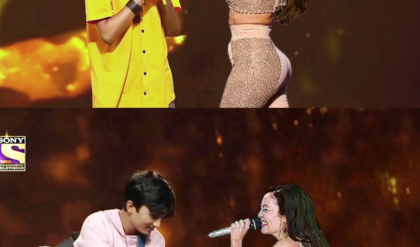Miss Peace Ukraine quit the competition before the semi-finals, accusing the authorities of exploitation
.
.
The tension between Kateryna Bilyk, the representative from Ukraine, and Nawat Itsaragrisil, the owner of Miss Grand International, has emerged as a significant issue within the beauty pageant community during the Miss Grand International 2024 competition.
This situation not only highlights individual grievances but also reflects broader themes regarding fairness, accountability, and the evolving nature of beauty pageants in a modern context.
Background of the Pageant
Miss Grand International has grown to be one of the most watched beauty pageants globally, known for its emphasis on advocacy, social issues, and the empowerment of women. Founded in 2013, the pageant has developed a unique identity, differentiating itself through its focus on humanitarian efforts alongside traditional beauty standards.
However, with increased visibility comes heightened scrutiny, and the expectations placed on contestants and organizers are continually evolving.
The Initial Incident
The tension escalated when Kateryna Bilyk publicly expressed her concerns regarding the treatment of contestants within the Miss Grand International framework.
During an interview and subsequent social media posts, Bilyk articulated her feelings about the decision-making processes of the pageant’s management, suggesting that some contestants received preferential treatment while others did not.
-
Criticism of Conduct: Bilyk’s comments centered on her perception of inequality in how contestants were treated during events, particularly regarding promotional opportunities, media engagement, and overall support from the organization. She claimed that these discrepancies created an uneven playing field that undermined the spirit of competition.
Social Media Amplification: With the rise of social media, Bilyk’s criticisms quickly gained traction, leading to widespread discussion among fans and supporters. Her statements resonated with many who shared similar sentiments about fairness in beauty competitions, resulting in a flurry of supportive messages directed at her online.
Response from Nawat Itsaragrisil
In the face of Bilyk’s allegations, Nawat Itsaragrisil responded publicly, defending the organization and its policies. He emphasized the complexity of managing an international competition and asserted that all decisions made were in the best interest of the pageant as a whole.
-
Defending Organizational Integrity: Itsaragrisil addressed Bilyk’s claims by outlining the protocols that the pageant follows, stating that every contestant has an equal opportunity to shine. He described the challenges of organizing such a large-scale event and noted that the organization strives to create a fair and supportive environment for all participants.
Disappointment in Public Criticism: Nawat expressed disappointment in Bilyk’s choice to air grievances publicly rather than addressing them directly with the organization. He viewed her approach as potentially damaging to the reputation of Miss Grand International and counterproductive to the collaborative spirit that the pageant seeks to promote.
Broader Implications of the Conflict
The clash between Bilyk and Itsaragrisil raised several important issues that resonate within the broader context of beauty pageants and societal expectations:
-
Fairness and Equity in Pageantry: Bilyk’s remarks opened the door for discussions about fairness in beauty competitions. Many fans and former contestants have long expressed concerns about the transparency of decision-making processes and the need for clear guidelines that ensure all participants are treated equitably.
The Role of Social Media: The incident also highlighted the powerful role of social media in shaping public perception and discourse. Contestants now have platforms to voice their opinions, and these can rapidly influence public sentiment. This shift presents both opportunities and challenges for pageant organizers, who must navigate the complex landscape of digital communication.
Accountability of Pageant Organizers: The situation called into question the accountability of pageant organizers. As contestants increasingly feel empowered to speak out against perceived injustices, there is a growing expectation that organizations must respond constructively to such criticisms. The call for accountability can lead to significant changes in how pageants are run and governed.
Public and Industry Reactions
The public response to the conflict was mixed, with many rallying behind Kateryna Bilyk while others supported Nawat Itsaragrisil.
-
Support for Bilyk: Numerous fans and beauty enthusiasts applauded Bilyk for her courage in speaking out. Many echoed her concerns about fairness and inequality, arguing that her remarks could serve as a catalyst for change within the beauty pageant industry.
Criticism of Public Discourse: Conversely, some individuals criticized Bilyk for her public approach, suggesting that such disputes should be resolved internally rather than through social media. They argued that public criticism could damage the pageant’s reputation and create unnecessary drama.
Consequences and Future Directions
The fallout from this tension has potential long-term consequences for both Kateryna Bilyk and Miss Grand International.
-
Impact on Bilyk’s Career: Depending on how the situation unfolds, Bilyk may face repercussions within the pageant circuit. Contestants who publicly challenge their organizations may find themselves isolated or ostracized, which could impact their future opportunities.
Organizational Changes: For Miss Grand International, the incident could prompt a reassessment of its policies and practices. The organization may feel compelled to establish clearer guidelines regarding contestant treatment and decision-making processes to prevent similar issues in the future.
Cultural Shift in Pageants: This conflict may signal a broader cultural shift within the pageant industry, as contestants increasingly advocate for their rights and seek to create a more equitable environment. The dialogue initiated by Bilyk could encourage other contestants to voice their concerns and influence positive change within the industry.
Conclusion
The tension between Kateryna Bilyk and Nawat Itsaragrisil during Miss Grand International 2024 serves as a pivotal moment in the ongoing evolution of beauty pageants. It encapsulates the challenges faced by both contestants and organizers in navigating issues of fairness, representation, and accountability.
As the industry grapples with these complex dynamics, it is clear that the voices of contestants are becoming increasingly influential in shaping the future of pageantry.
Moving forward, it will be essential for organizations like Miss Grand International to listen to the concerns of their participants and adapt to the changing landscape of public expectations. The events surrounding Bilyk and Itsaragrisil not only highlight the need for transparency and fairness but also reflect a growing recognition that beauty pageants must evolve to remain relevant in a rapidly changing world.
News
Scandalous! Celebrity Caught in a Shocking Incident with a Fan in Public!”
Shocking Incident Involving Kareena Kapoor: A Fan Misbehaves in Front of the Media In a deeply unsettling incident, Bollywood actress Kareena Kapoor Khan found herself at the center of an unexpected and distressing situation when a fan reportedly touched her…
End of content
No more pages to load






